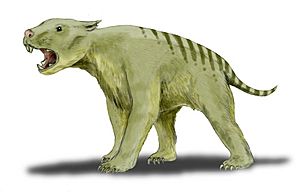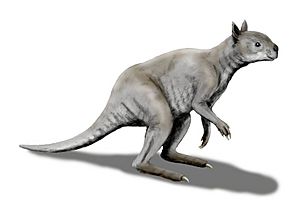Fossil Cave facts for kids
Quick facts for kids Fossil Cave |
|
|---|---|
| The Green Waterhole, 5L81 | |
| Location | Princes Highway, Tantanoola, South Australia, Australia |
| Depth | 15 metres (49 feet) |
| Length | 70 metres (230 feet) |
| Geology | Oligocene coralline limestone |
| Entrances | 1 |
| Difficulty | Above water - no stated difficulty Underwater - CDAA Advanced Cave grade |
| Hazards | silting, overhead environment |
| Access | Above water - public (no disabled access). Underwater - CDAA members only. |
| Cave survey | FUUC, 1978 Allum and Garrad, 1979 SAUSS, 1987 Horne, 1986-88 |
Fossil Cave (also known as 5L81) is a cool cave in the south-eastern part of South Australia. It used to be called The Green Waterhole. You can find it near Tantanoola, about 22 kilometers (14 miles) north-west of Mount Gambier. It's super close to the Princes Highway!
This cave is special for two main reasons: it's full of amazing fossils, and it's a popular spot for brave cave divers.
Contents
What is Fossil Cave?
Fossil Cave formed in limestone that's about 30 million years old. This limestone was made from ancient corals! It's a type of cave called a sinkhole, which means the ground above it collapsed. Most of the cave is filled with water.
The opening at the surface is about 20 meters (66 feet) long and 10 meters (33 feet) wide. Underwater, the cave stretches up to 70 meters (230 feet) long and 30 meters (98 feet) wide.
How Did Fossil Cave Get Its Name?
The cave's name was officially changed to Fossil Cave on April 23, 1989. Before that, it was known as The Green Waterhole. The government decided to change the name because of all the important fossils found there.
Amazing Animal Fossils
Since the mid-1960s, scientists and divers have found many subfossils of ancient birds and mammals in Fossil Cave. These remains were found on a pile of rocks about 15 meters (49 feet) deep underwater.
Scientists think these animals probably fell into the cave while trying to get a drink of water and then drowned. Most of these fossils are from animals that lived between 15,000 and 40,000 years ago.
What Extinct Animals Lived Here?
Besides bones from animals that are still alive today, divers have found fossils of many extinct species. These include:
- Two types of birds: Centropus colossus and Orthonyx hypsilophus.
- Several mammals, like the Thylacinus cynocephalus (Tasmanian Tiger).
- The fierce Thylacoleo carnifex (Marsupial Lion).
- Other unique creatures like Propleopus oscillans, Macropus titan, and Protemnodon anak.
- Several types of giant, short-faced kangaroos called sthenurine kangaroos, including Procoptodon gilli, Procoptodon maddocki, and Simosthenurus occidentalis.
Exploring the Cave
The first fossils were collected from Fossil Cave in 1964. More collections happened in 1968. The South Australian Museum organized several trips to the cave between 1968 and 1974. In 1987, the South Australian Underwater Speleological Society (SAUSS) also carried out an excavation.
Divers have mapped the underwater parts of the cave at least three times. This mapping was done by groups like the Flinders University Underwater Club (FUUC) in 1978, Allum and Garrad in 1979, and the SAUSS in 1987.
Diving in Fossil Cave
Fossil Cave is a well-known spot for cave diving. However, it's not for beginners! Only divers who have reached the Advanced Cave grade with the Cave Divers Association of Australia are allowed to dive here. This is because cave diving can be very challenging and requires special skills and training.
 | Jewel Prestage |
 | Ella Baker |
 | Fannie Lou Hamer |



